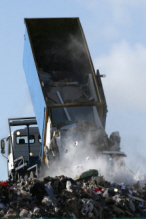Separate collection and ‘TEEP’ Requirements
 Michael Grimes and Andrew Hirst set out the legal background to the separate collection requirements that waste collection authorities will have to meet from next year.
Michael Grimes and Andrew Hirst set out the legal background to the separate collection requirements that waste collection authorities will have to meet from next year.
From 1 January 2015 waste collection authorities must ensure that waste, paper, metal, plastic and glass are collected separately in accordance with the Waste (England and Wales) Regulations 2012 (the “Regulations”).
The Regulations transpose the Waste Framework Directive 2008/98/EC (the “Directive”) in England and Wales. Regulation 13 states that an establishment which collects waste, paper, metal, plastic or glass must, from 1 January 2015, take all such measures to ensure separate collection of that waste, when separate collection is:
- appropriate to meet the necessary quality standards for the relevant recycling sectors; and
- technically, environmentally and economically practicable (“TEEP”).
In line with the Directive, the Regulations state that co-mingled collection with subsequent separation is viewed as a form of separate collection for the purpose of regulation 13, provided that it can achieve high quality recycling similar to that achieved with separate collection.
The European Commission issued guidance for national authorities on the interpretation of each element of the TEEP requirements as follows:
- Technically practicable – the separate collection may be implemented through a system which has been technically developed and proven to function in practice;
- Environmentally practicable – the added value of ecological benefits justify possible negative environmental effects of the separate collection (e.g. additional emissions from transport); and
- Economically practicable – a separate collection which does not cause excessive costs in comparison with the treatment of a non-separated waste stream, considering the added value of recovery and recycling and the principle of proportionality.
Lord de Mauley, the Parliamentary Under Secretary, released a letter offering advice on TEEP. While not to be viewed as statutory guidance, the letter urges waste collection authorities to take reasonable steps to keep collected streams separate in order to produce high quality recyclates.
Lord de Mauley acknowledged that many Materials Recycling Facilities struggle to keep glass shards out of paper streams, or produce low quality mixed glass shards which then require further sorting. Glass was also identified during the 2013 judicial review of the Regulations as impacting on the quality of recyclates. This suggests that, in order to meet the necessary quality standards for the relevant recycling sectors, particular attention needs to be given by waste collection authorities to the assessment of separate glass collections.
The 2013 judicial review of the Regulations also concluded that in deciding whether a separate collection meets the TEEP requirements, a context-specific exercise balancing the environmental and economical effects is required. Mr Justice Hickinbottom held that “the test for technical, environmental and economical practicability not only permits but demands consideration of the particular collection circumstances.”
Given the need to consider the particular circumstances of collection, the decision as to the practicability of separate collections lies with the individual waste collection authorities, leading to varying interpretations of the requirements, particularly in relation to glass collection. While Dorset County Council has implemented a separate glass collection, East Cambridgeshire District Council concluded that eliminating glass from co-mingled collections would result in additional costs and more collection vehicles.
Due to the varying interpretations of the requirements DEFRA was due to publish guidance for waste collection authorities. It was announced on 17 January 2014 that there are no longer plans to do so, and that waste collection authorities should seek their own legal advice on the point to ensure compliance. However on 22 May 2014, DEFRA’s unfinished guidance was released. While still in draft form, it reiterates the idea that including glass in commingled collections does not commonly achieve high quality recycling. Rather, hybrid solutions are possible, whereby separate collections are used for one stream but not for others. Additionally, the draft guidance confirms that local collection authorities are responsible and accountable for making the decision as to whether separate collection is necessary and practicable on the basis of their unique ability to take into account local circumstances.
To aid in the decision making process, the Waste Action and Resources Plan (“WRAP”) have released a route map to TEEP, which can be accessed here. This includes information for waste collection authorities to understand their legal obligations under the Regulations, particularly concerning the separate collection of glass, metal, paper and plastic, and expands on the European Commission’s guidance on the interpretation of each element of TEEP. It presents a step-by-step process to aid in assessing whether current waste collection services are compliant with the requirement to collect materials separately, and is a useful resource for councils to follow, providing a suggested route for local authorities to follow, in order to ensure compliance.
It is clear that a “one-size-fits-all” approach to TEEP does not exist and all local authorities must be prepared to review their current services to put in place the correct processes for their area in order to minimise the risk of challenge under the Regulations. Even authorities which are currently collecting material separately should ensure a robust assessment of their collection system is undertaken before January 2015 to ensure compliance with TEEP.
Michael Grimes is a Partner and Andrew Hirst is a Senior Associate at Eversheds. Michael can be contacted on 0845 498 4769 or by email, while Andrew can be reached on 0845 498 4629 or by email.
